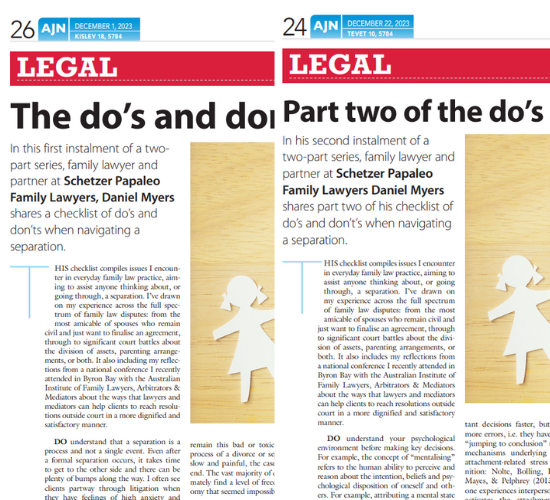Back in March this year I wrote regarding the news that Parliament had just passed a law to merge the Family Court and the Federal Circuit Court and the colourful headlines this sparked, many of them critical and warning it might dilute the Court’s expertise or put an even extra burden on an underfunded system.
In recent weeks the new Court, the Federal Circuit and Family Court of Australia (FCFCA), has taken shape with a series of updates given about the new Court’s operation and procedures.
The most relevant of these appear to be:
- For first time since 1999, family law cases will have a single point of entry and uniform rules, forms and case management processes. The intention is to simplify procedures and enable cases to be moved through the family law system quickly and fairly.
- There will be a new case management model which sees increased involvement of Senior Registrars, Registrars and Family Consultants early in the process to undertake the triage and case management of all matters filed. This is designed to alleviate the front-end case management burden on Judges and ensure that they are able to hear and determine trials and deliver judgments in the matters that require judicial attention as quickly and efficiently as possible.
- In the general course, matters filed in the new Court will follow a nationally consistent case pathway, which is set out in general terms in the following diagram:

The First Court event is to take place within 6 to 8 weeks of filing. Parties should be at mediation or dispute resolution within 5 to 6 months of filing before they have spent too much money on costs and have become too entrenched in the system.
If parties are still unable to settle, they will be sent to trial which is to commence, where possible, within 12 months. These steps are aimed at resolving up to 90% of cases within 12 months which would be a substantial improvement.
One of the innovations of the Court appears to be a new Fast Track Hearing List to deal with less complex cases that can be heard earlier and without the need for cross examination, but by submissions only.
- Court proceedings will be governed by a Central Practice Direction. Fundamental to the Central Practice Direction is the continuation of the 10 Core Principles that underpin the exercise of the family law jurisdiction.
- Risk
- Parties’, lawyers’ and the Court’s obligations and overarching purpose
- Efficient and effective use of resources
- Approach to case management
- Importance of Dispute Resolution
- Non-compliance
- Lawyers’ obligations about costs
- Identifying and narrowing issues in dispute
- Preparation for hearings
- Efficient and timely disposition of cases
- In addition to the requirement to comply with section 60I of the Family Law Act and file a certificate or seek an exemption when parenting orders are sought, both the Applicant and Respondent to an Application for Final Orders (for either parenting or property orders) will be required to file a Genuine Steps Certificate, certifying that they have complied with the pre-action procedures and made a genuine attempt to resolve the dispute, with the usual exceptions for genuine urgency or where it is not safe to undertake these steps.
- The development of further specific court lists, each dealing with a discrete area or application type, for example:
- A National Contravention List, to be introduced on 1 September 2021 to address the expectation that all parties will comply with orders of the Court.
- The existing COVID-19 list to deal with family law disputes impacted by the pandemic.
- The existing Magellan List, a specialist division that deals with cases of serious allegations of sexual abuse or physical abuse of children.
- The Chief Justice has confirmed there will be increased use of technology in the new court. Electronic hearings will continue and are a welcomed addition to regional and rural Australians and vulnerable people who struggle to attend court. His Honour anticipated that 25% will continue electronically for some time. However, moving forward, trials will generally be face-to-face if it is safe to do (for instance, in light of the COVID-19 pandemic).



